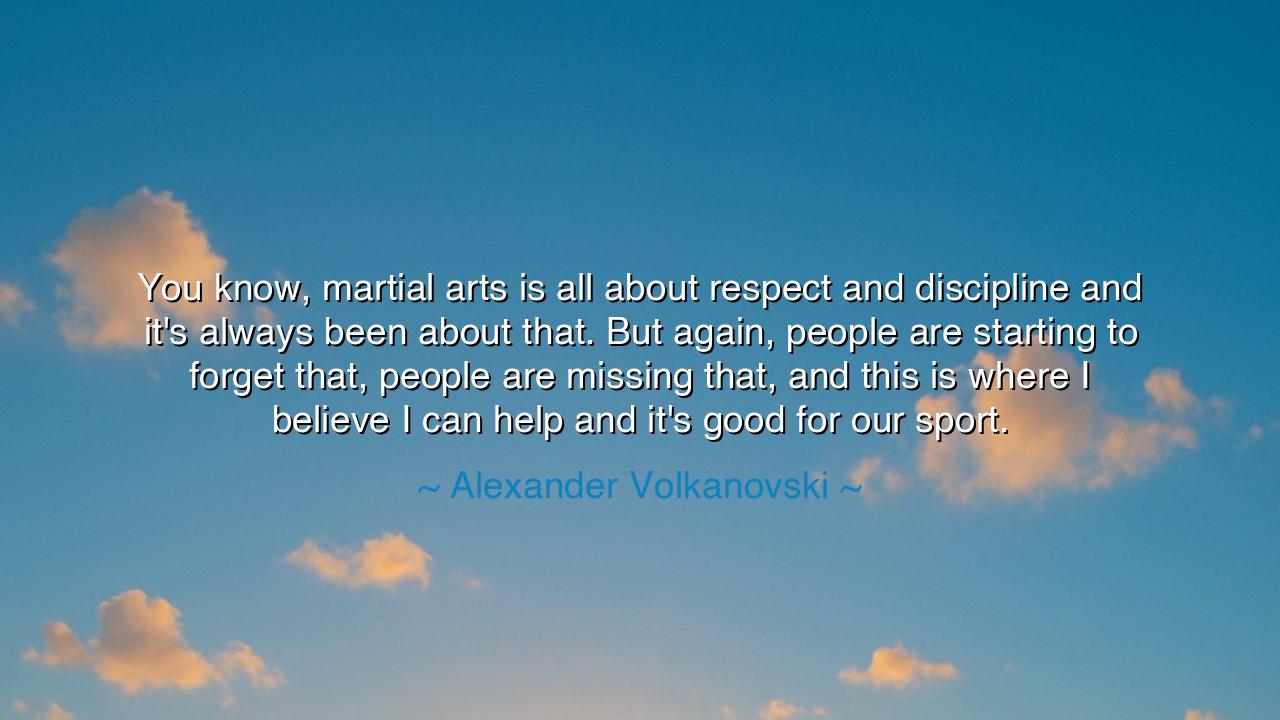
You know, martial arts is all about respect and discipline and
You know, martial arts is all about respect and discipline and it's always been about that. But again, people are starting to forget that, people are missing that, and this is where I believe I can help and it's good for our sport.






When Alexander Volkanovski said, “You know, martial arts is all about respect and discipline and it's always been about that. But again, people are starting to forget that, people are missing that, and this is where I believe I can help and it's good for our sport,” he spoke not as a mere athlete, but as a guardian of an ancient tradition. His words carry the gravity of centuries — the echo of monks, warriors, and masters who understood that strength without respect is savagery, and discipline without humility is tyranny. In this age of spectacle, where victory is often celebrated louder than virtue, Volkanovski reminds the world that martial arts is not only about combat, but about the spirit that governs it — a code of honor that refines the warrior’s heart even more than his fists.
In the old world, every art of war was first an art of self-mastery. The sword was not forged merely to cut, nor the hand trained merely to strike; both were instruments of understanding, tools to measure one’s own limits. The masters of old — the samurai of Japan, the Shaolin monks of China, the philosophers of Greece — all knew that true power arises not from aggression, but from discipline. To bow before an opponent was not a ritual of weakness, but an act of profound strength — the recognition that one faces not an enemy, but a mirror of oneself. Volkanovski’s lament that people are “starting to forget” this is, in truth, a cry for remembrance — a call to return to the roots of respect that once made martial arts a path toward wisdom, not just victory.
The origin of Volkanovski’s words lies in his own journey — a man who rose from humble beginnings, a rugby player turned world champion, shaped not by arrogance, but by integrity. In the brutal arena of modern combat, he carries the spirit of the old masters: one who fights not to destroy, but to perfect. He sees, as many before him have, that when fame and spectacle overtake humility and discipline, the sacred art of the warrior begins to wither. In his quote, there is both a warning and a vow — a warning that the modern world’s obsession with glory threatens the moral spine of the sport, and a vow that he will strive to restore it.
History, too, teaches us this balance. Consider the tale of Miyamoto Musashi, the legendary samurai of seventeenth-century Japan. Musashi was undefeated in over sixty duels, yet in his later years, he abandoned combat to live as a hermit, writing The Book of Five Rings. In it, he taught that victory in battle means nothing if one has not conquered the self. “The way of the warrior,” he wrote, “is the resolute acceptance of death.” What he meant was this: that the true warrior fights not for pride or applause, but for truth — for mastery over fear, anger, and ego. Volkanovski, too, speaks in this lineage, as one who sees beyond the cage, beyond the crowd, to the enduring discipline that makes a fighter more than a fighter — a martial artist.
In the modern age, where every battle is recorded, every triumph broadcast, and every fighter tempted by vanity, the virtues of respect and discipline are easily forgotten. Yet without them, the martial arts lose their soul. The bow before the match, the handshake after defeat, the humility in training — these are not traditions to be discarded, but the very rituals that keep chaos from devouring skill. Volkanovski’s vision is to restore that balance, to remind both fighter and fan that honor is the foundation of greatness. A champion who does not carry respect in his heart is no champion at all, for victory without virtue is but an empty crown.
And so, his message is not only for the warrior, but for every human being. For life itself is a kind of combat, filled with challenges that test our resolve, our patience, our pride. We, too, must learn to face these battles with the heart of a martial artist — with discipline in action, respect for others, and control over ourselves. When anger rises, bow to it with awareness; when conflict comes, meet it with calm; when success finds you, receive it with humility. In this way, every person may live the spirit of martial arts, even without stepping into an arena.
Thus, let this teaching be remembered: Power without respect corrupts, and skill without discipline destroys. Whether in sport, work, or daily life, the measure of mastery lies not in victory over others, but in mastery of oneself. Alexander Volkanovski’s words are a call to return to the way of the ancients — to honor, humility, and respect. For only when strength kneels before virtue does it become something greater than force — it becomes wisdom in motion, and in that, the true soul of martial arts is reborn.






AAdministratorAdministrator
Welcome, honored guests. Please leave a comment, we will respond soon